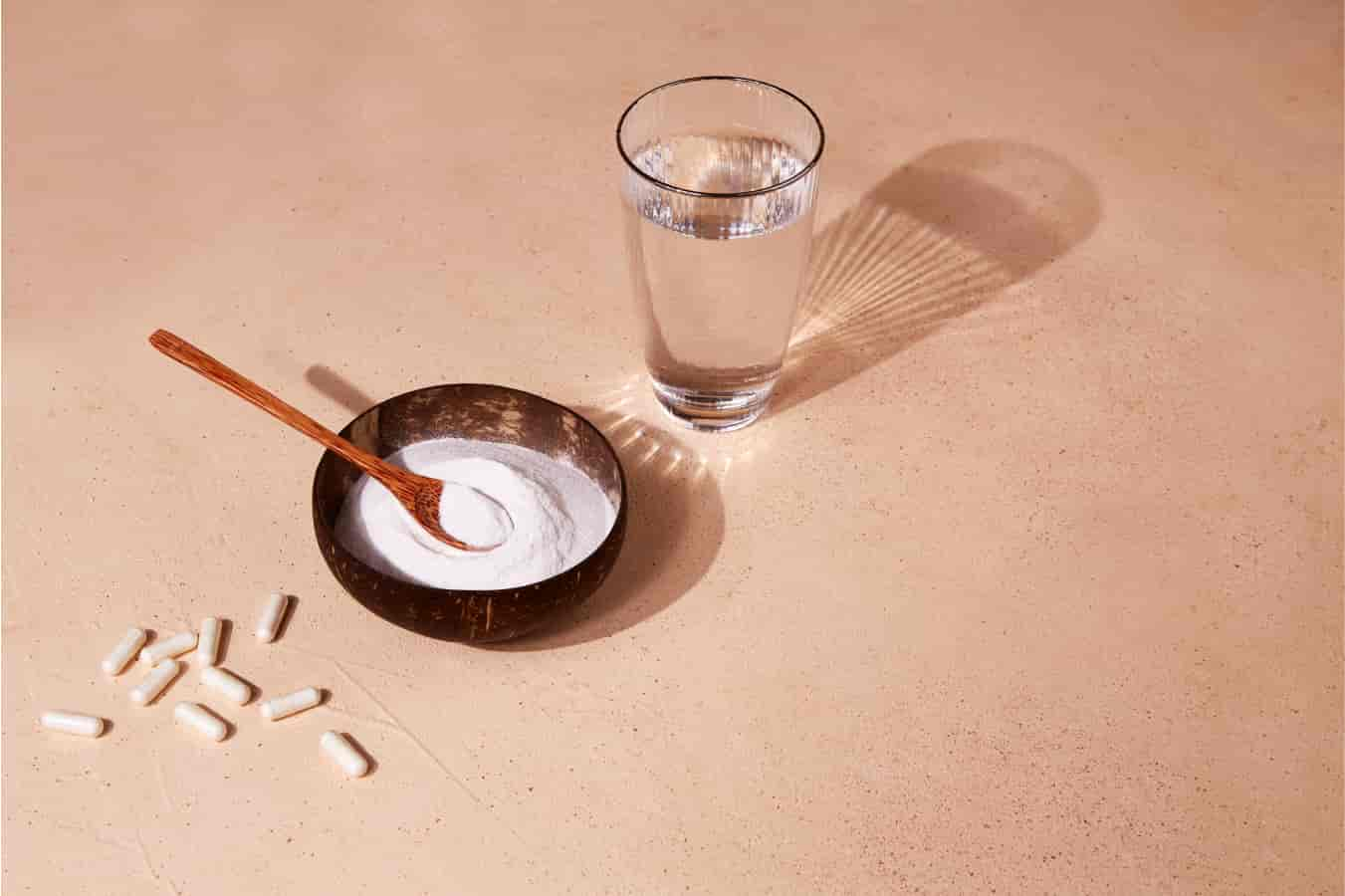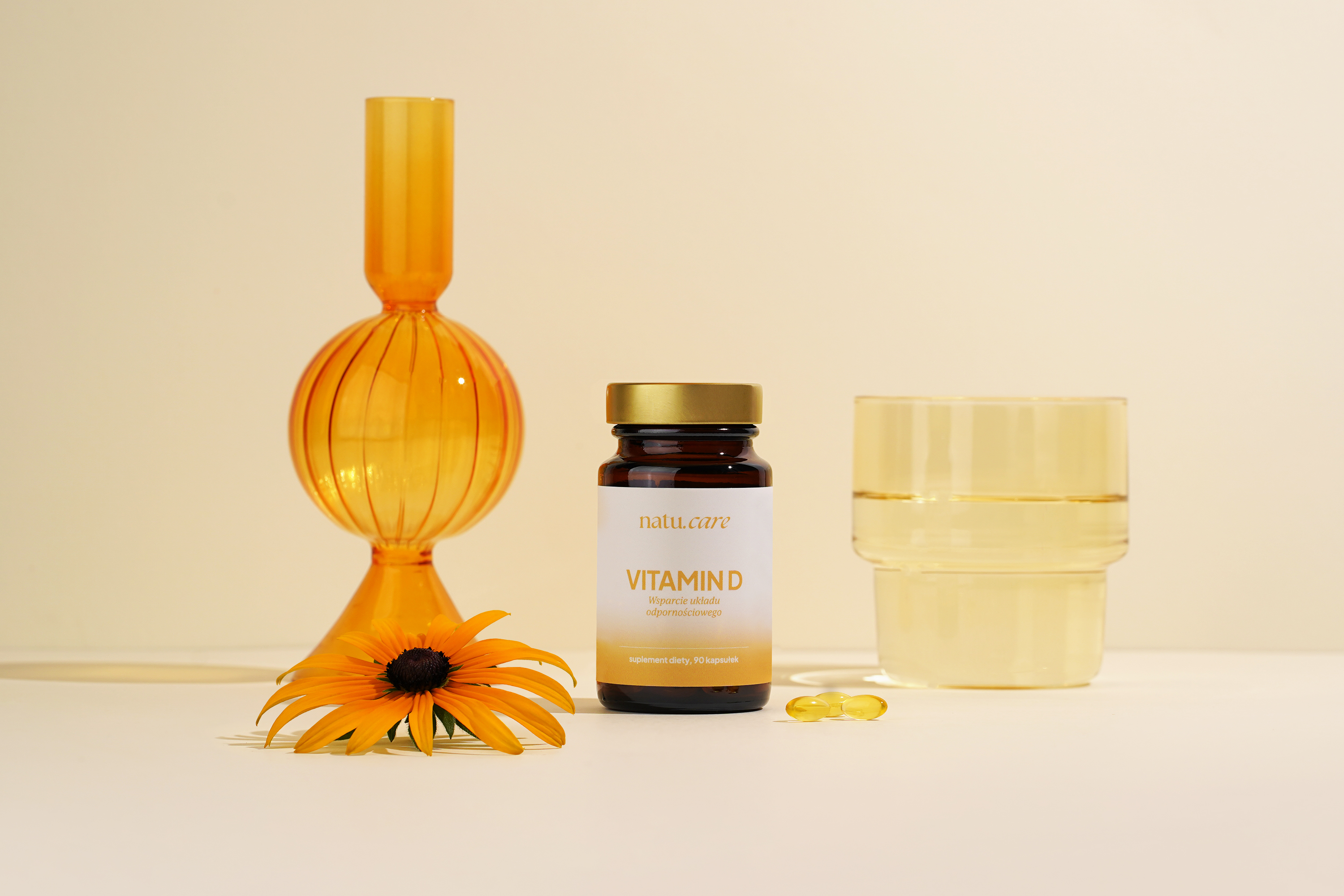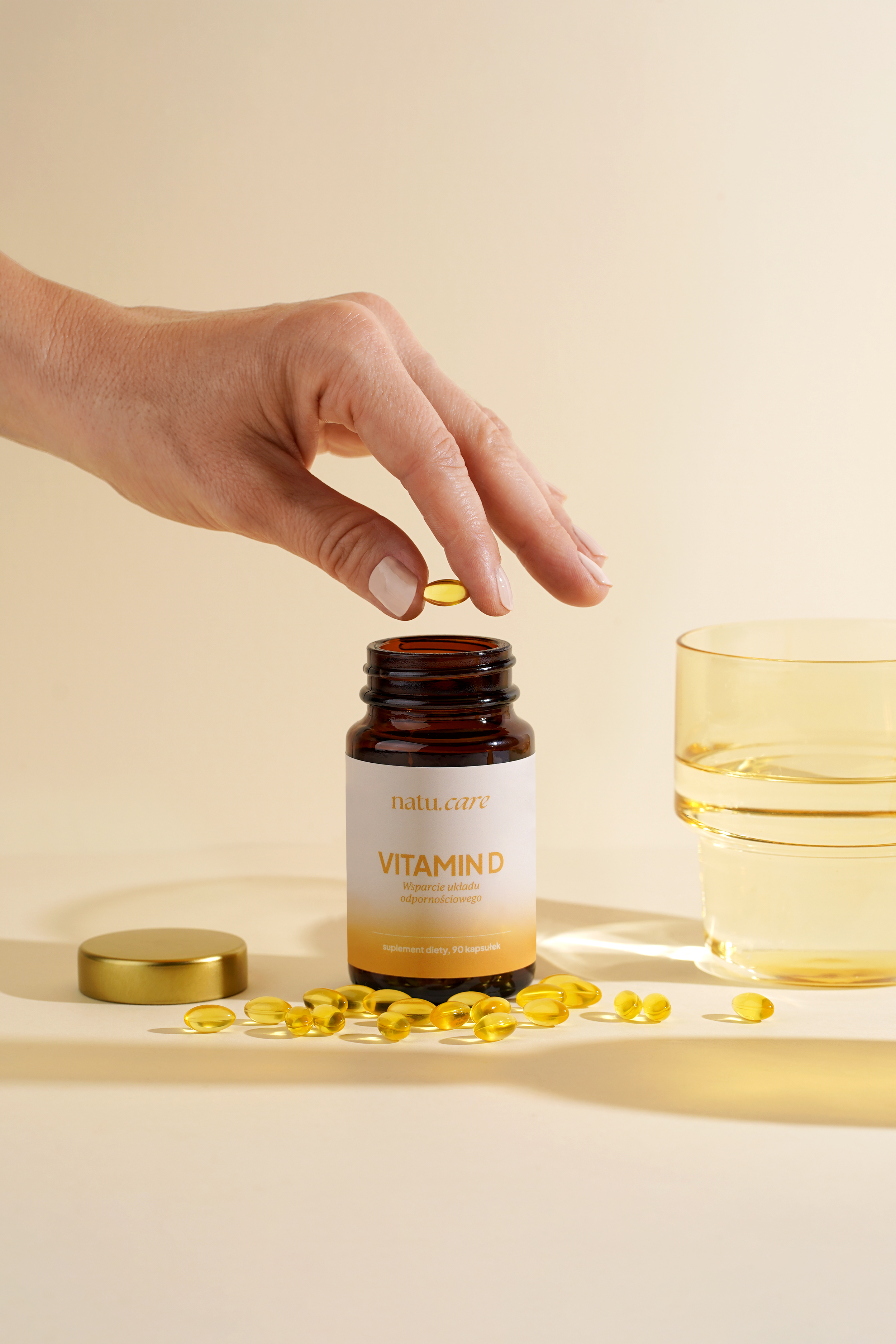Vitamin K2 - properties, occurrence, contraindications
Vitamin K2 is an interesting vitamin that is involved in many processes in the body.


Learn more about our editorial process
.

Learn more about our editorial process
.

Learn more about our editorial process
.

Learn more about our editorial process
.
Why you can trust us
Articles on Natu.Care are written based on scientific research, data from government websites and other reliable sources. The texts are written in cooperation with doctors, nutritionists and other health and beauty experts. Articles are reviewed before publication and during significant updates.
.Learn more about our editorial process
.Information about advertisements
Content on Natu.Care may contain links to products from the sale of which we may receive a commission. When creating content, we adhere to high editorial standards and take care to be objective about the products discussed. The presence of affiliate links is not dictated by our partners, and we select the products we review ourselves completely independently.
.Learn more about our terms and Conditions
.When you read this introduction, your bacterial flora is producing vitamin K2! Yes, vitamin K2 has made itself at home in your gut and takes care of its proper concentration in your body. In this text, you will find the most important information about this chemical compound.
Supplement manufacturers recommend products with vitamin K2, but since your body produces it itself, do you need to supplement it at all? From this article, you'll learn what role vitamin K2 plays in the body, the most tasty sources and who is at risk of deficiency.
Description of contents:
.- Vitamin K - a breakdown .
- Vitamin K1 or K2? .
- Vitamin K2 - properties .
- Vitamin K2 deficiency .
- Vitamin K2 excess .
- Daily requirement of vitamin K2
- Daily requirement of vitamin K2 .
- Vitamin K2 in infants .
- Sources of vitamin K2 .
- Contraindications to use .
- Summary .
- FAQ .

Zobacz, co dla Twojego zdrowia może zrobić Natu.Care Witamina D 2000 IU. -15% z kodem BLOG15
Natu.Care Witamina D 2000 IU
Natu.Care Witamina D 2000 IU wspiera prawidłowe działanie układu odpornościowego, utrzymanie zdrowych kości i zębów oraz utrzymanie prawidłowych funkcji serca, nerek i układu mięśniowego.
Sprawdź cenę
Świetny produkt, tabletki są małe i wygodne do połknięcia. Plus za wysoką jakość!Joanna
See also:
- Vitamin K [action + deficiency symptoms] .
- Vitamin D3 K2 [whether you need to combine + expert opinion]
- Vitamin D3 drops [ranking + use + expert opinion]
- Vitamin K2 [properties + occurrence] .
- Best vitamin D3 [ranking + expert opinion] .
- Vitamin D deficiency [symptoms + treatment] .
- Vitamin D [dosage + standards and recommendations] .
- Vitamin D overdose [symptoms + effects + what to do] .
- What is vitamin D? [sources, table, examples] .
- Maximum dose of vitamin D [what + expert opinion] .
Vitamin K - breakdown
.
When we write about vitamin K, we mean a group of organic chemical compoundsand fat-soluble.
Consists of:
.
- vitamin K1 - phylloquinone, of plant origin, .
- vitamin K2 - menaquinone, of animal origin and produced in the intestines, .
- vitamin K3 - menadione, a synthetic form of vitamin K. .
The main function of all vitamin K is to activate proteinsand which have important functions in blood clotting, heart and bone health. Due to differences in absorption and transport to tissuesand throughout the body, vitamin K1 and K2 may have different effects on your health.
Vitamin K1 or K2?
.
The two vitamins differ in absorption, transport and tissue distribution . The biological half-life of vitamin K2 is higher than that of vitamin K1 . In studies involving humansand researchers observed that vitamin K2 supplements generally improved bone and heart health, while vitamin K1 did not provide significant benefits.
Other studiesand analysing the effects of vitamin K1 supplementation on bone density and vascular calcification are negative or show no difference. In contrast, studies using vitamin K2 show improvements in bone quality rather than bone density, with significant reductions in fractures and prevention of vascular calcification.
In this article, we will focus on vitamin K2 and explain what its role is in the body. You will encounter this form in dietary supplements, often in combination with other fat-soluble vitamins - A, D, E. Click a vitamin to find out more about it.
K2 MK7 - the only right vitamin?
.
Vitamin K2 is a group of compounds that differ in the number of isoprenoid units in the side chain (from 4 to 13). It is assumed that the notation gives the symbol K2 together with the number of carbon atoms in the side chain given in brackets, e.g. K2 (6), or the symbol MK with the corresponding number of isoprenoid units, e.g. MK-6.
.
Vitamin K2MK7 is the best absorbed form of vitamin K2. It shows greater efficacy due to its higher bioavailability and longer half-life than other forms of vitamin K. This form is very often found in dietary supplements, e.g. in combination with vitamin D3..
 .
.
Ilona KrzakMaster of Pharmacy
Did you know that you don't need to supplement vitamins D3 and K2 together? Read why in the article about vitamin D3 K2.
Vitamin K2 - properties
.
Vitamin K2 is produced by the bacteria that make up the intestinal flora in our digestive system . The synthesis of this vitamin by the microorganisms found in the jejunum and ileum covers a significant part of our daily requirement for this vitamin . And what role does vitamin K2 play for us?
.
Vitamin K2:
.
- .
- provides proper blood clottingand, .
- helps prevent calcium deposition in the arteries ,
- its normal levels prevent atherosclerosis, stroke, heart attack ,
- plays an important role in bone metabolism , .
- may help prevent osteoporosis ,
- may reduce the likelihood of recurrence of liver cancer .
Vitamin K2 deficiency
.
At the outset, let me reassure you - vitamin K2 deficiency is rareand. You can get it from your diet (I'll give you some inspiration later in the text) and it is produced by the gut flora. Unfortunately, despite this, there are some risk factors for deficiency - check them out.
Causes of vitamin K2 deficiency
.
Sometimes diet and the hard work of our gut flora is not enough to have the correct levels of vitamin K. Risk factors for vitamin K2 deficiency include:
- fat malabsorption, .
- disorders of the digestive system (coeliac disease, inflammatory bowel disease, short bowel syndrome)and, .
- eating disorders (anorexia, bulimia) ,
- excessive, prolonged consumption of alcohol ,
- diseases of the liver, .
- use antibiotics or anticoagulants .
Symptoms of vitamin K2 deficiency in adults
.
How might your body manifest a vitamin K2 deficiency? Worrying symptomsand are:
- coagulation disorders (prolonged wound healing time, haemorrhages, easy formation of bruises) intestinal disorders, .
- abundant menstrual periods, .
- cirrhosis,
- frequent diarrhoea, and
- frequent diarrhoea, .
- lower immunity, .
Effects of vitamin K2 deficiency
.
Unmedicated deficiency is dangerous to health. Vitamin K2 deficiency has deplorable effects on:
.
Bone system
.
Osteocalcin is a protein synthesised in cells that is responsible for calcium ion balance and stimulates bone mineralisationand. Osteocalcin function depends on the correct concentration of vitamin K2 in the bodyand.
Deficiency of this vitamin results in an inability of osteocalcin to bind calcium in the bones. This may contribute to an increased risk of bone fractures and lead to osteoporosis.
Cardiovascular system
.
When we are deficient in vitamin K2, our cardiovascular system suffers. Deficiency of this vitamin leads to calcification of the arteriesand. We put ourselves at risk of developing congestion, heart attack, atherosclerosis, stroke.
Remember that deficiency of this vitamin is not common , unlike, for example, vitamin D. It's good to know what the causes and consequences of a deficiency are - but don't worry about it in advance. And you know what's even rarer than a deficiency? An excess of vitamin K2.
Vitamin K2 excess
.
Excess of this vitamin is rare. Symptoms of overdoseand reported in the literature include excessive sweating, feeling hot, breakdown of red blood cells and the onset of symptoms of haemolytic anaemia.
Researchers are looking at toxicity ofand vitamin K3 (synthetic vitamin K, menadione), which is used to treat deficiency or prevent and control bleeding associated with low blood prothrombin levels.
Summary:
.
Vitamin K2 deficiency and excess are rare occurrences. If you take care of your intestinal flora and have a varied menu, you are not in danger of lacking this vitamin, and certainly not in excess. If you have any doubts, share them with your doctor.
.
Contraindications to use
.
Contraindications to vitamin K2 (and K2 Mk7 supplements) include pregnancy, breastfeeding, use of anticoagulant medications containing vitamin K antagonists (warfarin, acenocoumarol) or kidney diseaseand.
.
If in doubt, speak to your doctor. However, as you already know from the article, supplementation with vitamin K2 or K2Mk7 is rather unnecessary in your case.
Daily vitamin K2 requirements
.
The requirement for this vitamin varies and depends on age, gender and health status, among other factors. Due to insufficient evidenceand regarding the function, absorption as well as occurrence of menaquinones (K2) in humans, standards have been set only for phylloquinone - vitamin K1.
However, let's assume that in order to be healthy and meet your daily requirement for this vitamin, you should consume about 60 µgand. OK, but what does this mean? What does it look like in practice? Read below what are the sources of vitamin K2 in food.
Vitamin K2 in infants
.
Supplementation of vitamin K for infants is recommended by the Polish Neonatal Societyand. The recommendations are dictated by the low content of this vitamin in breast milk and, at the same time, by the incompletely developed bacterial flora of infants' intestines. All newborns and within the first 5 hours of life should receive vitamin K (usually by injection).
Vitamin K2 deficiency in infants can appearand manifest in this way:
- bleeding from the site where the umbilical cord was removed, .
- bleeds in the skin, nose, gastrointestinal tract or other areas,
- bloods from the skin, nose, gastrointestinal tract or other areas.
- bleeding from the penis (if the child has been circumcised), .
- current bleeding into the brain, .
If you are a new parent and are concerned about your child's vitamin K2 deficiency, be sure to raise the issue with your family doctor.
See also health articles:
.
- Blood tests [how often to do them + how to prepare] .
- Cortisol testing [standards + price] .
- Thyroid tests [which ones to perform + norms + results]
Sources of vitamin K2
.
The best sourcesand of vitamin K2 are:
- natto (Japanese food made from fermented soybeans) - 998 µg, .
- soft cheeses (e.g. mozzarella, feta) - 506 µg, .
- mould cheese - 440 µg .
- goose liver - 369 µg .
- hard cheeses (e.g. gouda, edam) - 282 µg, .
- beef liver - 106 µg .
- carb 63 - µg, .
- hen's egg yolk 67 µg to 192 µg, .
- pepperoni - 41.7 µg, .
- turkey sausage - 36.6 µg, .
- chicken meat - 35.7 µg, .
- frankfurter turkey - 31.2 µg, .
- salami - 28 µg, .
- whole milk - 38.1 µg, .
- bacon - 35 µg, .
.Natto outclasses its other rivals when it comes to vitamin K2 content. Interestingly, studies have shown that in regions of Japan where women consumed the most natto, there was a low rate of bone fractures.
 .
.
Marta Kaczorek Clinical nutritionist
See also other articles on vitamins and minerals:
.
- Vitamin B12 deficiency [causes + symptoms + treatment] .
- Vitamin D deficiency [symptoms + treatment] .
- Potassium [deficiency + norm + what it's in]
- Zinc [properties + deficiency + excess] .
- Iron [properties + sources + deficiency]
- Selenium [properties + dosage + supplementation] .
- Iodine [properties + dosage + deficiency symptoms] .
As a diet enthusiast, I had to try what natto tastes like. It's a great source of protein, vitamins and minerals. And then there's that dose of vitamin K2! I couldn't let go.
Let's just say it was... an interesting experience. And you, are you familiar with natto? Let me know in the comments.
Let me know.
Summary
.
Wondering how much vitamin K2 your bacterial flora produced while reading my article? In addition to this tidbit, remember this:
- Vitamin K is made up of 3 organic compounds: K1 - phylloquinone, K2 - menaquinone, K3 - menaadione.
- Vitamin K is a vitamin K compound.
- Vitamin K2 deficiency is rare. If you have a varied diet and take care of your gut flora, don't worry about a deficiency.
- The best sources of vitamin K2 are fermented and animal products. .
FAQ
.What does vitamin K2 help with?
.Vitamin K2 is involved in the blood clotting process. It is also important for bone health, as it helps to transport calcium from the blood to the bones - this maintains their normal structure and prevents osteoporosis.
A deficiency of vitamin K2 can lead to an increased risk of bleeding, poorer clotting, as well as weaker bones and an increased risk of osteoporosis.
What is the difference between vitamin K2 and K2 MK7?
.Vitamin K2 and K2 MK7 are two different forms of vitamin K2. The difference between the two is the length of the side chain. Vitamin K2 MK7 has a longer half-life, which means that it stays in the body longer than other forms of this vitamin. As a result, it can affect your body for longer. It is the best form of vitamin K2 with high bioavailability, which is often used in dietary supplements.
What is the best vitamin K2?
.Vitamin K2 comes in various forms - including K2 MK4 and K2 MK7. The best absorbed form is K2 MK7, so if you are looking for a supplement, look out for this form. Importantly, check the bacteria listed in the product formulation. Ideally, they should be Bacillus subtilis natto, which is a bacteria naturally present in fermented products that will help better absorb vitamin K2.
Does vitamin D3 need to be taken with vitamin K2?
.No, it is not necessary to supplement these vitamins together. Vitamin D deficiency is common, unlike vitamin K. The two vitamins work together in our bodies, but taking this combination is not mandatory, especially if you have a varied diet.
Find out why you should supplement with vitamin D3 drops and find out which product won the ranking of the best vitamin D.
Who should not take vitamin K2?
.Vitamin K2 is widely recognised as healthy and safe. If you belong to one of the groups listed below, exercise caution and consult your doctor or clinical nutritionist for supplementation:
- persons taking anticoagulants - vitamin K2 affects blood clotting; .
- persons with diseased kidneys - they may have problems removing excess vitamin K from the body properly; .
- pregnant and breastfeeding women - at this particular time, any new ingredient in diet during pregnancy should be consulted with a health care practitioner; .
- persons with hypersensitivity to vitamin K; .
When is the best time to take vitamin K2?
.It all depends on how it is supplemented and the individual needs of the body.
If you are taking it as an ingredient in a dietary supplement, read the manufacturer's recommendations. Vitamin K2 is fat-soluble, so it is best taken with a meal containing healthy fats, such as nuts, oily fish, avocado, olive oil.
If you want to include it as an ingredient in your diet, read the manufacturer's recommendations.
If you want to include foods rich in vitamin K2 in your diet, choose eggs, meat, cheese or fermented products.
Does vitamin K2 cause blood clots?
.No, vitamin K2 does not cause blood clots, although, yes, it does play its role in regulating blood clotting processes. Studies suggest that vitamin K2 deficiency may increase the risk of cardiovascular disease, including coronary artery disease, atherosclerosis and blood clots.
Sources
.See all
.Boston, 677 Huntington Avenue, & Ma 02115 +1495-1000 (2012, September 18). Vitamin K. The Nutrition Source. https://www.hsph.harvard.edu/nutritionsource/vitamin-k/
Brown, P. C., Dulik, D. M., & Jones§, T. W. (1991). The toxicity of menadione (2-methyl-1,4-naphthoquinone) and two thioether conjugates studied with isolated renal epithelial cells. Archives of Biochemistry and Biophysics, 285(1), 187-196. https://doi.org/10.1016/0003-9861(91)90348-M
Conly, J. M., & Stein, K. (1992). The production of menaquinones (vitamin K2) by intestinal bacteria and their role in maintaining coagulation homeostasis. Progress in Food & Nutrition Science, 16(4), 307-343. https://pubmed.ncbi.nlm.nih.gov/1492156/
DiNicolantonio, J. J., Bhutani, J., & O'Keefe, J. H. (2015). The health benefits of vitamin K. Open Heart, 2(1), e000300. https://doi.org/10.1136/openhrt-2015-000300
Effect of vitamin K2 on progression of atherosclerosis and vascular calcification in nondialyzed patients with chronic kidney disease stages 3-5. (n.d.). https://doi.org/10.20452/pamw.3041
.Full article: Helicobacter pylori antibiotic eradication coupled with a chemically defined diet in INS-GAS mice triggers dysbiosis and vitamin K deficiency resulting in gastric haemorrhage. (n.d.). Retrieved March 21, 2023, from https://www.tandfonline.com/doi/full/10.1080/19490976.2019.1710092
Gijsbers, B. L. M. G., Jie, K.-S. G., & Vermeer, C. (1996). Effect of food composition on vitamin K absorption in human volunteers. British Journal of Nutrition, 76(2), 223-229. https://doi.org/10.1079/BJN19960027
Griffin, R. M. (n.d.). Do You Get Enough Vitamin K? WebMD. Retrieved March 21, 2023, from https://www.webmd.com/vitamins-and-supplements/supplement-guide-vitamin-k
Growing evidence of vitamin K benefits for heart health. (n.d.). ScienceDaily. Retrieved March 21, 2023, from https://www.sciencedaily.com/releases/2021/08/210809144115.htm
Halder, M., Petsophonsakul, P., Akbulut, A. C., Pavlic, A., Bohan, F., Anderson, E., Maresz, K., Kramann, R., & Schurgers, L. (2019). Vitamin K: Double Bonds beyond Coagulation Insights into Differences between Vitamin K1 and K2 in Health and Disease. International Journal of Molecular Sciences, 20(4), Article 4. https://doi.org/10.3390/ijms20040896
Hamidi, M. S., & Cheung, A. M. (2014). Vitamin K and musculoskeletal health in postmenopausal women. Molecular Nutrition & Food Research, 58(8), 1647-1657. https://doi.org/10.1002/mnfr.201300950
Ishida, Y. (2008). [Vitamin K2]. Clinical Calcium, 18(10), 1476-1482. https://pubmed.ncbi.nlm.nih.gov/18830045/
Jarosza, M., Rychlik, E., Stoś, K., & Charzewska, J. (n.d.-b). Nutrition standards for the Polish population and their application. https://www.pzh.gov.pl/wp-content/uploads/2020/12/Normy_zywienia_2020web-1.pdf
Koshihara, Y., & Hoshi, K. (1997). Vitamin K2 Enhances Osteocalcin Accumulation in the Extracellular Matrix of Human Osteoblasts In Vitro. Journal of Bone and Mineral Research, 12(3), 431-438. https://doi.org/10.1359/jbmr.1997.12.3.431
Kubo, Y., Rooney, A. P., Tsukakoshi, Y., Nakagawa, R., Hasegawa, H., & Kimura, K. (2011). Phylogenetic Analysis of Bacillus subtilis Strains Applicable to Natto (Fermented Soybean) Production. Applied and Environmental Microbiology, 77(18), 6463-6469. https://doi.org/10.1128/AEM.00448-11
Maresz, K. (2015). Proper Calcium Use: Vitamin K2 as a Promoter of Bone and Cardiovascular Health. Integrative Medicine: A Clinician's Journal, 14(1), 34-39. https://www.ncbi.nlm.nih.gov/pmc/articles/PMC4566462/
Martinez, C., Wallenhorst, C., Rietbrock, S., & Freedman, B. (2020). Ischemic Stroke and Transient Ischemic Attack Risk Following Vitamin K Antagonist Cessation in Newly Diagnosed Atrial Fibrillation: A Cohort Study. Journal of the American Heart Association, 9(2), e014376. https://doi.org/10.1161/JAHA.119.014376
Mizuta, T., Ozaki, I., Eguchi, Y., Yasutake, T., Kawazoe, S., Fujimoto, K., & Yamamoto, K. (2006). The effect of menatetrenone, a vitamin K2 analog, on disease recurrence and survival in patients with hepatocellular carcinoma after curative treatment. Cancer, 106(4), 867-872. https://doi.org/10.1002/cncr.21667
Nowak, J. K., Grzybowska-Chlebowczyk, U., Landowski, P., Szaflarska-Poplawska, A., Klincewicz, B., Adamczak, D., Banasiewicz, T., Plawski, A., & Walkowiak, J. (2014). Prevalence and correlates of vitamin K deficiency in children with inflammatory bowel disease. Scientific Reports, 4(1), Article 1. https://doi.org/10.1038/srep04768
Office of Dietary Supplements-Vitamin K. (n.d.-a). Retrieved March 21, 2023, from https://ods.od.nih.gov/factsheets/VitaminK-HealthProfessional/
Office of Dietary Supplements-Vitamin K. (n.d.-b). Retrieved March 21, 2023, from https://ods.od.nih.gov/factsheets/VitaminK-HealthProfessional/
Sato, T., Inaba, N., & Yamashita, T. (2020). MK-7 and Its Effects on Bone Quality and Strength. Nutrients, 12(4), Article 4. https://doi.org/10.3390/nu12040965
Schwalfenberg, G. K. (2017). Vitamins K1 and K2: The Emerging Group of Vitamins Required for Human Health. Journal of Nutrition and Metabolism, 2017, e6254836. https://doi.org/10.1155/2017/6254836
Theuwissen, E., Smit, E., & Vermeer, C. (2012). The Role of Vitamin K in Soft-Tissue Calcification. Advances in Nutrition, 3(2), 166-173. https://doi.org/10.3945/an.111.001628
Urano, A., Hotta, M., Ohwada, R., & Araki, M. (2015). Vitamin K deficiency evaluated by serum levels of undercarboxylated osteocalcin in patients with anorexia nervosa with bone loss. Clinical Nutrition, 34(3), 443-448. https://doi.org/10.1016/j.clnu.2014.04.016
Vermeer, C. V. (2012). Vitamin K: The effect on health beyond coagulation - an overview. Food & Nutrition Research, 56(1), 5329. https://doi.org/10.3402/fnr.v56i0.5329
Vitamin K Deficiency-Nutritional Disorders. (n.d.). MSD Manual Professional Edition. Retrieved March 21, 2023, from https://www.msdmanuals.com/professional/nutritional-disorders/vitamin-deficiency,-dependency,-and-toxicity/vitamin-k-deficiency
VITAMIN K: Overview, Uses, Side Effects, Precautions, Interactions, Dosing and Reviews. (n.d.). Retrieved March 21, 2023, from https://www.webmd.com/vitamins/ai/ingredientmono-983/vitamin-k
Vitamin K in the prevention of bleeding resulting from deficiency in newborns. (n.d.). Retrieved March 21, 2023, from http://www.neonatology.edu.pl/index.php?option=com_content&view=article&id=116:vitamin-k-in-preventing-bleeding-resulting-from-its-deficiency-in-newborns&catid=8&Itemid=103
.
Editorials
Meet the team

Ilona Krzak obtained her Master of Pharmacy degree from the Medical University of Wrocław. She did her internship in a hospital pharmacy and in the pharmaceutical industry. She is currently working in the profession and also runs an educational profile on Instagram: @pani_z_apteki

Editor
Graduate of Journalism and Artes Liberales at the University of Warsaw. Since 2017, he has been working with the biggest portals in Poland and abroad as an editor. Previously worked for 3 years in one of the leading pharmaceutical companies - he knows the health and beauty industry inside out. In his free time, he most enjoys playing tennis or skiing.
![Vitamin B12 - where it occurs in the diet and in products [table].](https://cdn-resources.natu.care/uploads/1/balanced_diet_nutrition_healthy_eating_concept_food_sources_rich_vitamin_b12_cobalamin_kitchen_table_1_b84f75bda2.jpg)
Find out where vitamin B12 is found and which products will provide you with it.

Vitamin PP also known as niacin or vitamin B3 supports the proper functioning of the body.
![What is NMN? Effects, effects, side effects [supplements].](https://cdn-resources.natu.care/uploads/1/science_background_with_molecule_atom_abstract_structure_science_medical_background_3d_illustration_1_a5ec4d9cec.jpg)
Everything you want to know about NMN: properties, effects, safety and expert opinions.
